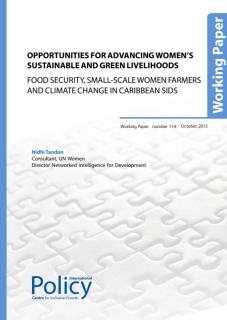
In this study, Opportunities for Advancing Women’s Sustainable and Green Livelihoods - Food Security, Small-Scale Women Farmers and Climate Change in Caribbean SIDS, the experiences of ‘women farmers’ in the agricultural productive system are taken to include small-scale farming (‘small farming’), farm labour, fisheries and aqua farming, husbandry and poultry farming, forestry-related production, as well as their roles in water management, land stewardship and natural habitat and coastal marine conservation. Women’s specific production activities range from growing seeds and saplings to harvesting and storing, to processing for household consumption, and marketing and selling for local markets and for the tourist industry. The study treats women’s productive, regenerative, stewardship and conservation roles as inherently inter-linked and inter-dependent.
The study has five sections. The first provides an overall portrait and context for this report. Sections 2 offers key findings and insights compiled from field research in Antigua and Dominica. The gender responsiveness of National Adaptation Plans of Action (NAPA) and other policy documents are also assessed. Section 3— Realising Innovation and Potential— presents a perspective on what is needed to underpin smart community responses to the compounded impacts of climate change and food insecurity. It pulls together some of the common elements and issues arising from the country studies and makes a strong case for capacity-building across the board.
The key premise of this study is that small-scale, ecologically sensitive farming and fishing in the Caribbean, which includes women in salient and vitally productive roles, present a critical way to deliver on three distinct but inter-related fronts:
- to anchor the local food security of rural populations— by integrating sound farming practices with the promotion of indigenous and hardy species, biological diversity and fresh foods of high nutritional value— while at the same time reducing dependence on imports;
- to secure and protect the interests of small Caribbean islands in international trading systems that are increasingly systematically unfavourable, by discovering and pursuing small-scale self-sufficiency and comparative advantages in areas of domestic know-how; and
- to protect and secure the full bio-diversity of Caribbean Small Island Developing States (SIDS) ecosystems and biomes — by using local farming practices that work to ‘optimise’ natural resources (instead of ‘maximising’ natural extraction) and by building reserves and contingencies. This in turn could lend itself to the integration of Payment for Ecosystem Services (PES) mechanisms with integration of the security of public environmental commons through land use and marine/coastal management with income benefits to farmers and rural entrepreneurs.
